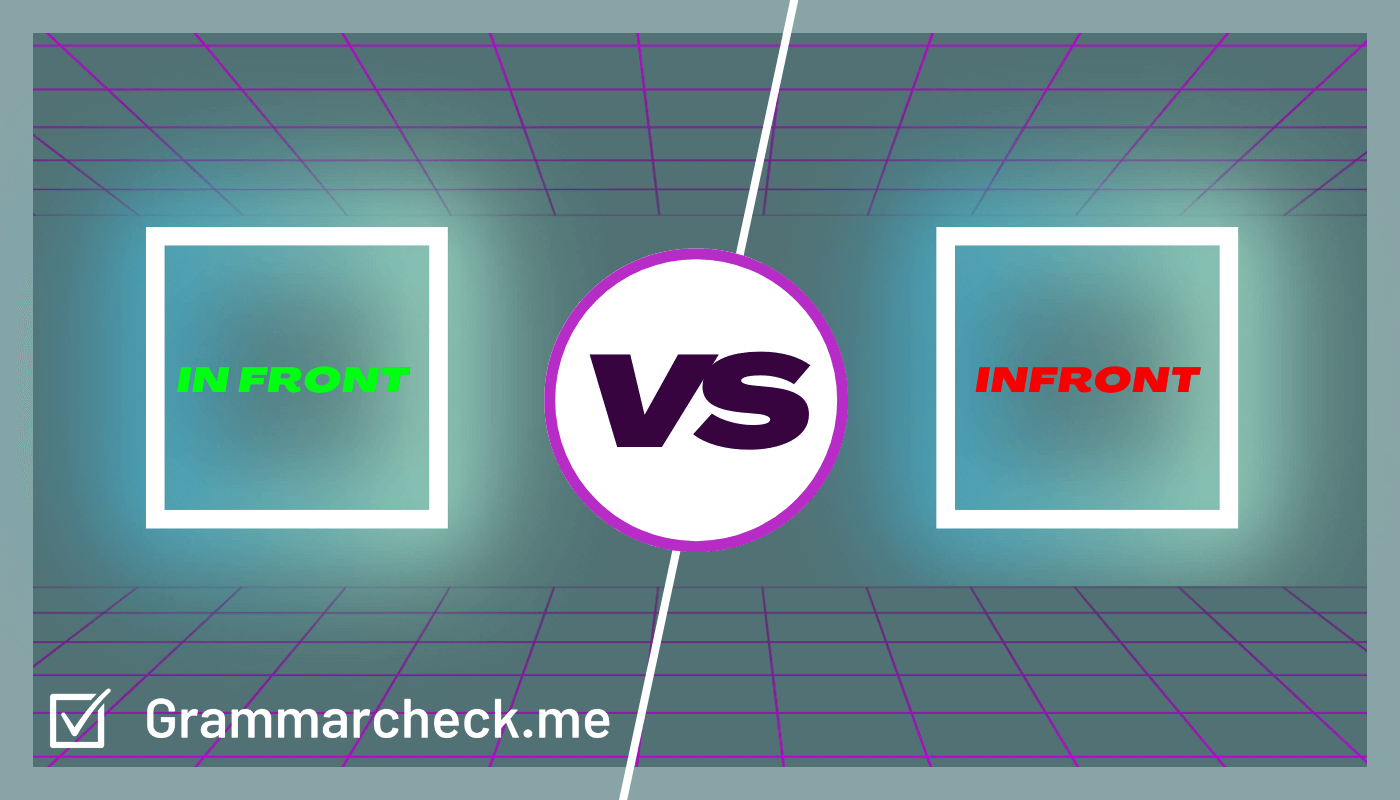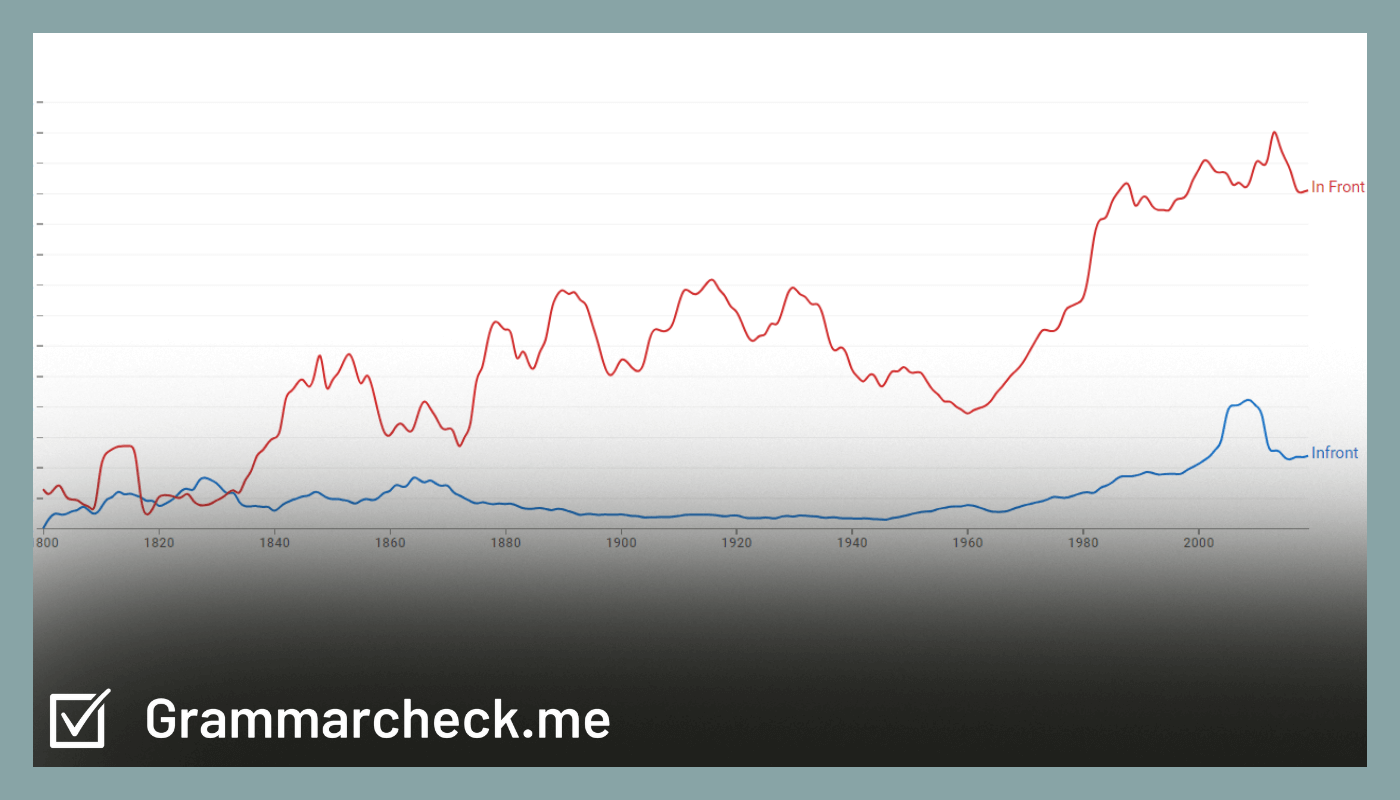“In front” is the correct spelling that should be used in all writing contexts. Removing the space to form the spelling “infront” is incorrect & should not be used in your writing.
The phrase “in front” is used to identify the location or direction of something relative to another object. In this post, we’ll explain the meaning of the two words “in front” and how to use them in a sentence.

Which Is The Correct Spelling: Infront or In Front?
The correct spelling is “in front.” This phrase dates back to Middle English & is used to denote a position or location that is ahead in relation to a particular reference point.
Just like we saw in our analysis of the words Goodnight vs Good Night, adding or removing a single space can change the meaning of a word.
Despite its long history of usage, the phrase “in front” is often spelling incorrectly. The most common misspellings are “infront” and “in-front.”
How Do You Use In Front In A Sentence?
Here are 5 example sentences that use the phrase “in front” correctly.
- The soldier led his comrades fearlessly into battle, always staying in front of the group.
- As the traffic light turned green, the car in front of me slowly started moving.
- The little girl nervously hid behind her mother when a big dog approached them in front of the park.
- The stunning sunset painted a breathtaking view of the mountains in front of us.
- The teacher asked the students to form a line and stand in front of the blackboard.
What Are Some Examples Of Idiomatic Expressions That Use “In Front”?
An idiomatic expression is a phrase or group of words that has a figurative meaning that is different than the literal definition of the words. Here are a list of 3 popular idiomatic expressions that contain the phrase “in front”.
- In front of the pack: This saying refers to being in 1st place of a competition or race.
- Put on a brave face in front of someone: This saying means to act courageous when facing a challenging situation in the presence of other people.
- In front of one’s nose: This saying is used to describe something that is obvious and easily noticeable.
What Are Synonyms For The Phrase In Front?
Here is a list of 3 popular synonyms for the phrase “in front”.
- Ahead
- Before
- Forward Position
Here is a list of 3 less common synonyms for the phrase “in front”.
- Foremost Position
- Anterior Position
- Preceding Position
Popularity Analysis

Google’s N-gram viewer collects data on the frequency of word & phrase occurrences in published writing. The data shows that “in front” as two words is used far more commonly than the spelling mistake “infront”. Just like we saw in our comparison of the words Successfully vs Succesfully, even incorrect spellings can become popular. Local slang and descriptive grammar rules can often lead to improper words becoming prominent in modern writing.
What Is The Opposite Of In Front?
The opposite of “in front” is behind. When something is behind, it means it is located at the back or rear relative to a reference point.
Here are 3 sentence examples of how to use the word “behind” correctly.
- In a race, the person finishing last is behind the other competitors.
- In a classroom, the teacher’s desk is usually behind the students’ desks.
- When walking in a group, the slowest person may be behind the others.
Frequently Asked Questions
No, the phrase in front cannot be used interchangeably with infront. The spelling infront can’t be used in formal or informal writing.
Yes, the phrase in front has the same spelling under British grammar rules as it does in American grammar rules.
The Bottom Line
By now you should be an expert on the different between the words in front or infront. The correct spelling is “in front” and is most commonly used to indicate the location of something. By removing the space between “in” & “front” is a typo and should not be used in your writing. If you need help with other spelling rules likes this consider using our own Grammar check review tool to make things easy!
